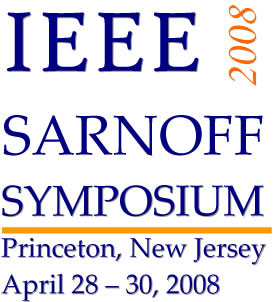|
2008
IEEE Sarnoff Symposium
April 28 - 30, 2008, Nassau
Inn in Princeton, NJ, USA
Sponsored by:

|
|
|
Henk Wymeersch
Postdoctoral Associate
Laboratory for Information and Decision Systems
Massachusetts Institute of Technology
Room 32-D574A tel: 617-2532821
https://www.mit.edu/~hwymeers/
Duration: 3 hours |
| Decription |
With the introduction of turbo codes in the early 1990s, a major leap forward was achieved in communications systems. Not only were we finally able to develop practical capacity-approaching codes, but we also managed to apply the general idea behind turbo codes (the so-called turbo principle) to many different applications. These include multi-user detection, channel estimation and MIMO systems. This has led to a myriad of algorithms, many of which are ad-hoc, using different terminology, different notations, different implementations, and are without any kind of coherent underlying theory. Factor graphs provide the underlying theoretical framework for most, if not all, of these turbo algorithms.
The framework is simple and elegant, and allows for a deep understanding of wide variety of algorithms, based on simple rules and a common notation. Factor graphs should belong to the toolset of anyone serious about algorithm design in future wireless communication systems and networks.
The goal of this tutorial is to present these concepts in a rigorous yet accessible manner, and show how advanced algorithms can be understood and designed in a systematic fashion. The tutorial is based on the book "Iterative Receiver Design", available from Cambridge University Press. |
| |
Short Bio:
Henk Wymeersch is a postdoctoral associate with the Laboratory for Information and Decision Systems (LIDS), at the Massachusetts Institute of Technology (MIT). He obtained the Ph.D. degree in electrical engineering in 2005 from Ghent University, Belgium. In 2005-2006, Henk Wymeersch was a postdoctoral fellow of the Belgian American Educational Foundation at MIT. In 2006 he won the Alcatel Bell Scientific Award for his Ph.D. thesis, and in 2007 he won the Best Paper Award at the IEEE Wireless Communications and Networking Conference (with Yuan Shen and Moe Win). He is currently an Associate Editor for IEEE Communications Letters and the Journal of Computer Systems, Networks, and Communications. He is also the author of the book from Cambridge University Press “Iterative Receiver Design.” His current research interests include location-aware networks, and statistical inference for communication systems. For more info: www.mit.edu/~hwymeers/ |
|
Back to Top
Back To Tutorials
|







